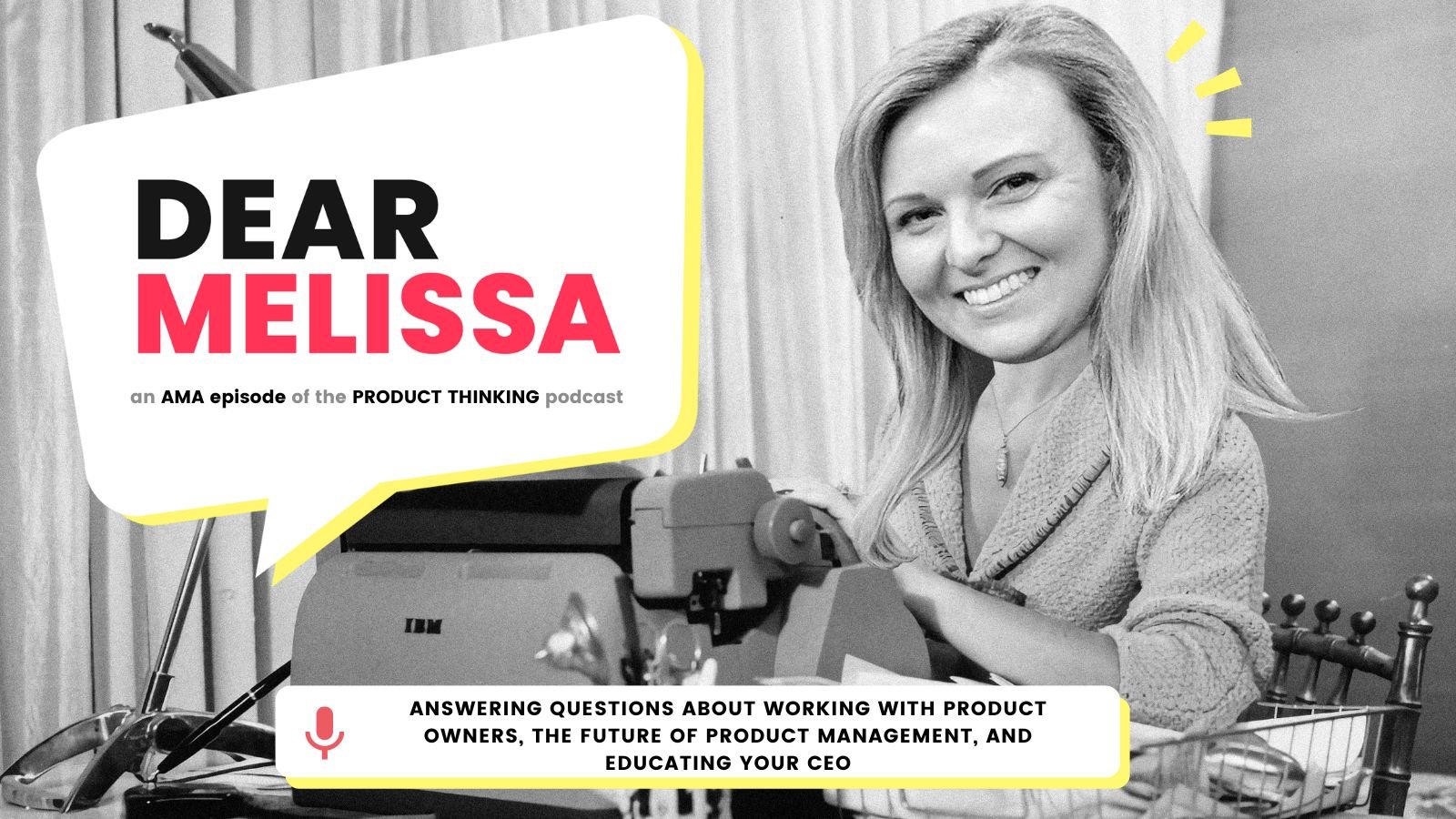Episode 109: Answering Questions About Product Strategy Audits, Offering Professional Services, and Staying or Leaving a Product Job
In this Dear Melissa segment, Melissa Perri answers subscribers’ questions about how to do a product strategy audit, offering professional services to one-off clients, and how to choose whether to stay on at the company in a new capacity.
Have a product question for Melissa? Submit one here and Melissa may answer it in a future episode.
Subscribe via your favorite platform:
Q: What steps, processes and resources would you recommend for conducting a product strategy audit? I'm considering a new role in product strategy, and I think the best place to start is a comprehensive review of the current strategy to the extent that it exists and how our product plans align with it.
A: That is the best place to do a product strategy audit, but you have to hit it from two sides. This is what I do when I go in to do a product strategy audit.
Q: One of our clients requires a custom SSO integration with a good amount of complexity. The client is expecting us to deliver it as professional services. They are paying for it, so they want a clear Gantt chart project plan and a project manager that can deliver on time, on scope, and on budget. I don't have technical project managers on my team, only product managers who are more discovery oriented and are used to building products, not as a service. I don't have enough professional service work to hire a project manager to be fully dedicated to this kind of work. …Any tips on how to handle this situation in the short term? While we can't hire someone specific for this role, how should we share roles and responsibilities between product tech and customer service?
A: I feel like there's some underlying problems that I'm picking out of this that are not just related to roles and responsibilities. Here’s how I would deal with this issue.
Q: I'm a team lead in a three person business intelligence team for a small company. We're currently undergoing a merger into a much larger enterprise with over 8000 staff. I'm seeing indicators that the product people in the larger enterprise have little interest involving me in product discovery and strategy, which areas of the previous environment that I really enjoyed. One stated they judge me as one of their technical people, which I interpret as they don't see a place for me in product discovery and direction. I believe I need to decide if I want to be a purely technical resource or find another job where I'm more welcome at the product discovery and strategy table. Are you able to give me any advice on navigating this situation?
A: I'm slightly mad that all of these product managers are completely dismissing you and you are a fantastic resource. This is crazy. So here's the thing. Business intelligence is a critical skill. They might not understand what you actually do. So let's start with that…
Resources
Melissa Perri on LinkedIn | Twitter
MelissaPerri.com | CPO Accelerator
Transcript:
Melissa:
Hello and welcome to another episode of Dear Melissa. Today, we've got three amazing questions, all about product strategy for you, and they all hit product strategy at different angles, which is very cool. So we will dive very deep into this topic, which I'm pretty excited about. Before we get there though, I wanna remind you that I do this every other week and you can submit all of your questions to me. So if you have career questions, if you have logistical questions about product management, if you don't know how to do something or navigate a situation, no question is too big or too small, explain to me what's going on and go to dear melissa.com and drop that question in there. Leave me a voicemail, love to hear your voices. It puts a nice little voice to all these names I get. And then I will be happy to answer that on the next episode.
We do prioritize voicemails, so if you wanna answer it quicker, that's the way to go. In addition, I am also lining up a bunch of conferences for this year. So if you would love me to come visit your conference or your company and speak, I will be out and about traveling, get in touch with me and let me know. I will be coming to Europe a couple times this year too, which is very exciting. Love coming to Europe. So if you do have a company over there and you'd like to do a session with me while I'm there, just let me know and I'll tell you what my itinerary is. Without further ado, let's get to these questions. First question, dear Melissa, what steps, processes and resources would you recommend for conducting a product strategy audit? I'm considering a new role in product strategy, and I think the best place to start is a comprehensive review of the current strategy to the extent that it exists, and how are product plans aligned with it?
So you are totally correct. That is the best place to do a product strategy audit, but you kind of have to hit it from two sides. And this is what I do when I go in to do a product strategy audit. First I start with bubbling up, bottoms up, what all the teams are working on. So that means that you go around to every team, you ask them to sum up what they're working on, or hopefully, hopefully, but this is never the case. You have something in Jira with like nicely stated, epics, <laugh> that sum up what all the work is that they're doing and why they're doing it. Now, more often than not, I'd say in 90% of the cases, it's not very neat for me, <laugh>, it's not all rolled up that way. So then what I do is I go talk to the teams and ask them what they're doing, and I try to make sense of it and write those epics myself or write you know what they should be delivering or why.
So you're trying to fill in the gaps from what the teams are working on, just trying to synthesize that. Now maybe there's roadmaps out there, there's roadmaps, fantastic use that leverage those. Ask for any of the documentation that currently exists, and that will also tell you how much documentation and what the processes look like for defining strategy, for defining roadmaps, all of that stuff so that you can see if that might be lacking. Once you have all the stuff the teams are working on, you're gonna start to look through them and say, can all of this go together and relate back to an outcome? Which outcomes are these tied to? And you wanna try to group them so that you can say, 80% of our work is going towards this retention outcome that we've got on here. 20% is going towards new sales in different geographies, let's say whatever it is.
But you wanna try to marry those back up into the business outcomes and try to figure out what they're related to. Now if this is clear, there will be really good initiatives above the work that the teams are doing that align back to those business outcomes, tell you the why, and then go straight up to the strategic intents. But again, more often than not, that doesn't exist. And you know, that's just the nature of what happens. So now we gotta do some sense making. Now we gotta figure out how to actually put those things in there. You are trying to bubble all that work up from the teams into the initiatives. Figure out if they match. If teams are working on things that are outside of these initiatives, if they are tied to outcomes, if they're not tied to outcomes and really look through that, the next thing you're gonna wanna do is take all those initiatives and go back up and say, Hey, out of all the business outcomes, you know we're solving 25 of them.
That's a lot of business outcomes. Do these all go together? Is there strategic intent here? Where do we wanna be spending our time? Then what you do is go to the executives and you ask them, okay, what are the most important things we could be working on? If you had to gimme top three business objectives, growing new logos, retention, whatever it is, make them prioritize, make them give you like number 1, 2, 3. Then you go back to the work and you try to figure out, are we doing more than three things? Are we doing three things? Is this appropriately portioned where you know, we have most of the work going towards strategic intent number one, or is it just spread out? Then you wanna surface that back up to the executives and say, Hey, this is what we currently have going on. Here's how it aligns back to these business objectives you told me were the most important.
And I will say it always stops with the c e O, whatever they figure out is what really is the most important. So ask them. And then if it's not all aligned, that gives you a really good opportunity to get in there and say, Hey, we should do a product strategy review and we should try to reconcile some of this stuff. What doesn't work is going in there and just blowing everything up and being like, oh, there's no strategy. There's usually a strategy. It just might be spread thin. It might not be manifesting well down to the teams, that's totally fine. But what I would really do is start with what's the work going on? Knowing that you're probably not gonna stop 50% of that work, and that's okay, that's what you should be doing. You should be continuing and delivering and trying to finish what you're doing, but you should be trying to set that strategy so that when those teams are done with those individual pieces, and I mean the stuff that really doesn't matter yet, you wanna stop that, but the stuff that is gonna be beneficial some way or another, finish it.
As long as they're close to being done, then you wanna be able to come up with the strategy to put the teams on next, right? So the ones that finished, they'll be able to roll off and get into the new strategy. So that's what I would do when you're looking at comprehensive review, A lot of this is just getting the right people in the right rooms to look at what's currently happening and make decisions about it. And I'd say that's 70% <laugh> of product strategy is like pulling information out of other people's brains, getting them in a room and getting them to agree. But then there's also the work of you trying to figure out how do I demonstrate to them that all of this work will equal X, Y, Z business outcomes? How do I calculate that out? How do I show them the business cases around these things?
And that's very important as well. So hopefully that helps. I love a good product strategy audit, so I wish you the best of luck with that, Oliver. Question number two, dear Melissa, one of our clients requires a custom SSO integration with a good amount of complexity. The client is expecting us to deliver it as professional services, they're paying for it, so they want a clear Gantt chart project plan and a project manager that can deliver on time, on scope and on budget. I don't have technical project managers on my team, only product managers who are more discovery oriented and are used to building products. Now IT as a service, and I don't have enough professional service work to hire a project manager to be fully dedicated to this kind of work. The day-to-day and skills of a discovery oriented product manager and a technical implementation project manager are pretty different.
Any tips on how to handle this situation in the short term? While we can't hire someone specific for this role, how should we share roles and responsibilities between product, tech and customer service? Okay, so I feel like there's some underlying problems that I'm picking out of this that are not just related to roles and responsibilities. My first question is how did you get into this situation where we have a client requiring an S SSO integration, who's gonna pay for it and not want to do that for everything? Professional service is a really good way to get added revenue, to customize a couple things for clients, but also to help validate work or get money for work that you are gonna push off further in the roadmap. So my bigger question here is, is s S O something that you wanna do for everybody? Is this a type of thing that scales, and if it isn't and it's a one-off for this client, now you're getting into services instead of product.
Now you're starting to say, oh, I'm just gonna build whatever these clients really want as one-offs and I'm not gonna be able to scale it. It's really easy to get into this, especially when you're a small company and I don't know how big you are, but if you're a small company and people are gonna pay you a lot of money, you're usually like, yeah, we can do that, we can do that. But you have to really buckle down and go back to the strategy and say, should we do that? Are we gonna do SSO for everybody? Is this on the roadmap? And if so, we need a strategy for it and you can treat this client like a Proofpoint and say, you know, we're gonna try it with this client, they're gonna pay us for it, and then you know, eventually we'll figure out how to do this and scale it later.
And that makes total strategic sense. But what you are talking about too here, is that you let the client dictate how you were gonna run this project and they're treating you like an agency now they're treating you like a consulting company they hired and they get to control, and that's not what you are. You are a product company. So first of all, the client should not be dictating how you get this work done. They should just be saying, I need a custom s sso and the whole company. You should be pushing back and being like, yep, we will do this for you, but we're not giving you a Gantt chart, we're not giving you a dedicated person, we're not doing this, we're doing this the way that we do it and this is how we do professional services. And if you wanna engage with us for it, great, and if not, get lost.
I know it's hard to do that when there's a lot of money on the line, but that's the case. It's like you should never let a client dictate how you run this stuff. That's not how this works. Now you're an agency, now you're a consulting company, now you're just selling services in time. Not worth it. That's not what a product company is. So first of all, I'd really try to figure out that mindset. Second of all, if this is a one-off thing that you are doing and you are never gonna do this again because you just listened to all my advice and said, Hey, actually this s SSO thing, it doesn't scale. We shouldn't not be doing this for everybody and we might wanna refine the way that we do professional services. Fantastic. Cool. So what do you do in the short term? Because you already promised this and you don't wanna lose this relationship from the client.
I would hire a freelancer. I would hire a temporary consultant to come in, play that role that you already agreed to and have them just work on this project and then leave temporary budget. Does it cost more? Yeah, but you also got yourselves into a pretty bad situation by doing it this way. So kind of have to pay the price for it, but I'm assuming that the money is worth it to have this client in the long run. And that's what you have to look at. So you kind of bite the bullet at this point. Hire somebody in temporarily who can get this done, get this done quickly. That's what you do. Now, let's say professional services is something strategic for you. You would like to add a new revenue stream for it. You believe that there's enough money here to warrant doing this over and over and over again, and your clients really want it.
That's good. There's tons of companies who do this very successfully. In this case, you're asking how should we share roles and responsibilities between product, tech, customer success? You're gonna wanna start a team that is all professional services and typically organizations have a team that works very closely with, sometimes it's owned by product, sometimes it's not, but usually it's not. But they work very closely with product and they come in and customize things for them and they'll have their own developers and they'll have their own product people and it'll be a small team that'll go in and do this work, but it's separate from the scrum teams that are building the product. You might decide that that is right for your company and decide to build that, and that's totally cool, but you need to do it as well. Thinking about if we add this service too, how can we use it for discovery work?
Let's say testing things with clients, getting stuff out a little faster. That might be on the roadmap later, but they're gonna bump it up because they pay for it. This happens all the time. It's not like ideal in a lot of people's minds, but this happens all the time. It's the reality of product. How can we do that but also keep a really tight thread with product management so that we're not just building a bunch of stuff into our product, bloating it, making it unusable, and never selling this to anybody ever again. You wanna make sure that doesn't happen. So professional services is a great way to make more revenue as a business and it can work very well with product. You can use it for discovery, but you gotta be really, really, really careful that you don't turn into an agency just building whatever anybody demands. So you gotta push back. In this case, I think your freelancer is the best option.
All right, last question. Dear Melissa, I'm a team lead in a three person business intelligence team for a small company. We're currently undergoing a merger into a much larger enterprise with over 8,000 staff. I'm seeing indicators that the product people in the larger enterprise have little interest in involving me in product discovery and strategy, which are areas of the previous environment that I really enjoyed. One stated they judge me as one of their technical people, which I interpret as they don't see a place for me in product discovery and direction. I believe I need to decide if I wanna be a purely technical resource or find another job where I'm more welcome at the product discovery and strategy table. Are you able to give me any advice on navigating this situation? This makes me mad. <laugh>, I'm like over here like smiling while I read this because I'm slightly infuriated.
I don't know, like I'm not smiling because I'm happy. I'm slightly mad that all of these product managers are completely dismissing you and you are a fantastic resource. This is crazy. So here's the thing, business intelligence is a critical skill. They might not understand what you actually do. So let's start with that. I think the situation is they don't understand what a resource like they have. And I, I wish you were on my team. Like if I had a business intelligence person working with me and all the stuff I've done over like the last decade, I probably could have gotten everything done four times faster and better. So the fact that they're don't see what's right in front of them is slightly infuriating. And I get why you're upset because you are a critical resource for product strategy. They probably don't know what what you do though.
Business intelligence is kind of like a old term. I know this is a large enterprise with 8,000 people too, so I don't know if they just don't get product management. There are a lot of places where an enterprise of that size, they're still becoming more product led, they're still understanding product management, they're still understanding product strategy. And if you were at a small company and then you just moved into this enterprise nine times outta 10, they probably don't really know what you do. So what do you do? You educate them. You gotta show them that you can help contribute to this work because you can help them with all this analysis stuff and all this math and pulling insights outta the business. So in your situation, what I would do is find somebody who might be amenable to you helping start with one person. Don't go to the whole team and start with what value you can provide.
Say like, Hey, I realized you're doing this kickoff or this product strategy stuff and you're probably gonna need analysis on like what market segmentation is going on and where do we thrive right now and what are some of the data from sales that we should be prioritizing, blah, blah, blah. Whatever you do, talk about those things. Say I can help you with that. I basically crunch internal numbers to help us figure out, you know, help give you some insights into what you should be doing for product strategy. And I'm not making that choice myself, like I don't give the definitive answer, but I'm just here to help. And I think if you come in from a place of humble helping that usually breaks down a lot of barriers. But you gotta picture value because I bet you they have no idea what you do as a business intelligence analyst, I know what you do, but in some of our organizations it could be product operations, like what Denise and I talk about, product operations, data analysts.
You'd be doing the same thing that I would hire somebody in that role to do. So you might need to just pitch yourself in a different light. And I really think that's what the issue is. They just don't get it. So I don't see you as a technical person. I see you as a data analyst. Maybe instead of calling yourself a business intelligence analyst, be like, I'm a data analyst. Can I help you pull some numbers and generate some insights from our organization to help you with your product strategy? I would rebrand yourself in this setting and maybe talk to your boss about just dropping the business intelligence piece and be like, Hey, can we just call ourselves like data analysts and go to the product managers and say, this is what I do, here's how the value is, this is what I can do for you.
I think if you explain it that way, a lot more people are gonna wanna take you up on that. And if they don't, it is not the right organization. And trust me, there are a million organizations out there who really, really want your help. And if you are having trouble, like with this title, look for like product operations, data analyst positions. Look for data analysts or chief of staff positions. Do this a lot as well. There's a lot of different names you could be using that might resonate better. So I would try to figure out if it's a naming thing and that's where I would start. All right, thank you so much for listening to this week's Dear Melissa. And again, got any questions for me, go to dear melissa.com, let me know what you're thinking. And with that, we will be back next Wednesday with another guest. We'll see you.





